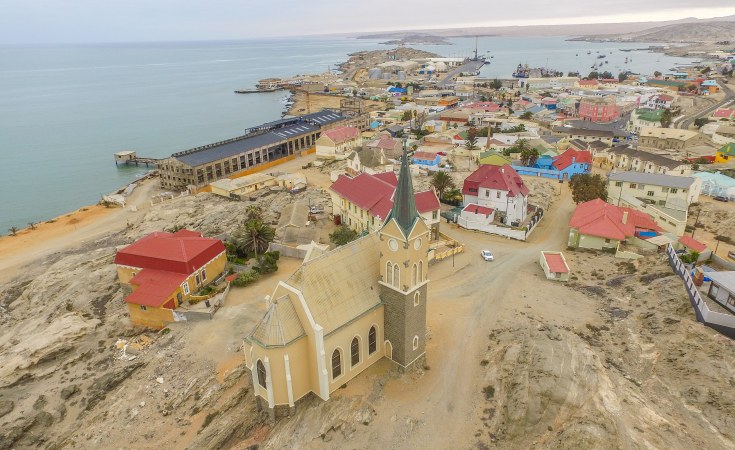By 1885, Adolf Lüderitz had acquired vast territories in today's Namibia. But his contracts with local people were so dodgy that even German colonial officials doubted them.
How did Germany first gain a foothold in modern-day Namibia?
By the 1880s, European cartographers knew there were just three safe bays to anchor ships across a coastline of around 2,000 kilometers (about 1,242 miles). Upon disembarking, travelers faced 140 kilometers of desolate desert stretching inland: The Namib desert.
Nama Chief Josef Fredericks II received a young German merchant named Heinrich Vogelsang at Bethany in southern Namibia in 1883.
In the name of German businessman Adolf Lüderitz, Vogelsang offered Fredericks 200 rifles and 100 pounds sterling for the area around a desolate bay on the Atlantic coast. A few months later, a second treaty followed: 60 rifles and 500 pounds sterling for land extending 20 geographical miles inland and all the way south to the Orange River, the border with South Africa.
Why was the land purchase so controversial?
The local measurement was the British mile, or 1.6 kilometers at that time. Geographical miles were unheard of -- and that's key. Because the German geographical miles the merchant refers to equals 7.4 kilometers. That is roughly six times more!
Lüderitz, Vogelsang, and the missionary witnessing the transaction knew that Fredericks had no idea how much of his peoples' land he was inadvertently selling.
How did private land purchases in Africa become part of the German state?
Private land acquisitions by German individuals in the Cameroons, South West Africa and East Africa were later taken over by the German state.
On colonial maps, Lüderitzland appeared, and in August 1884, Germany declared Lüderitzland a protectorate. This marked a crucial step in Germany's ambitions to form a settler colony.
Lüderitz had hoped to make a fortune off prospective land purchases in the Namib Desert by finding and exploiting minerals like copper. At one point, he owned the entire coastline of modern-day Namibia. Ultimately, he found nothing of value and ran out of money.
Lüderitz sold his possessions to the German Colonial Society in 1885 and went missing on an expedition soon after.
Where else were treaties used to gain land?
The treaties signed all over the continent were not fully understood by the natives, were not taken seriously, or were accepted under false pretenses. In Cameroon, German officials went to great lengths to erase and ignore demands made by local chiefs in the Germano Douala Treaty of 1884.
In late 1884, Carl Peters, without direct authorization from the German government, traveled through the modern day Tanzanian mainland, looking for local chiefs, telling them to sign German language papers he wrote. Often, after being plied with alcohol, chiefs were promised German protection.
Why did the German state eventually recognize these claims?
It's hard to believe someone like Chancellor von Otto von Bismarck, who initially was skeptical of Germany acquiring colonies, would then entertain the schemes of ambitious businessmen like Carl Peters, Adolf Lüderitz, or Adolph Woermann.
But in the mid-1880s, European nations were scrambling for colonies in Africa. Peters, for instance, argued that Belgian interest in Central Africa could harm Germany's own ambitions. Bismarck bowed to political pressure and agreed to grant Peters' territories 'protectorate' status.
What was the real aim of a "protectorate"?
So-called "protection treaties" were ostensibly signed to offer German protection to the local signatories so long as they submitted to Germany. Actually, they formalized Berlin's colonial claims against other competing European nations and meant the German state would defend these possessions. It was, therefore, key that other European nations respected the treaties, but when it came to honoring the treaties with respect to African people, the German-signed treaties were mostly insincere and often dubious.
Protection treaties gave German companies access to land, resources, and cheap labor and allowed them to bring German troops and weapons.
Why did local leaders sign such documents?
It is doubtful that local leaders in Tanzania, Namibia, Togo or Cameroon always understood what they were signing away. Some chiefs wanted weapons to settle scores among local rivalries. Others, like the Douala chiefs in Cameroon, saw their demands erased from the German version of the treaty, and in other cases, German colonists, knowing they had the backing of superior weapons and professional military, simply disregarded the agreements.
What were the consequences for local people?
The ruling of the colonies was left to a handful of German colonialists. None of them had local interests at heart, and mostly used military force to crush resistance, and acquire labor for infrastructure projects and farms.
Shadows of German Colonialism is produced by DW, Germany's international broadcaster with funding from Germany Federal Foreign Office (AA). Consulting for historical accuracy was provided by Professor Lily Mafela, Professor Kwame Osei Kwarteng and Reginald Kirey.


